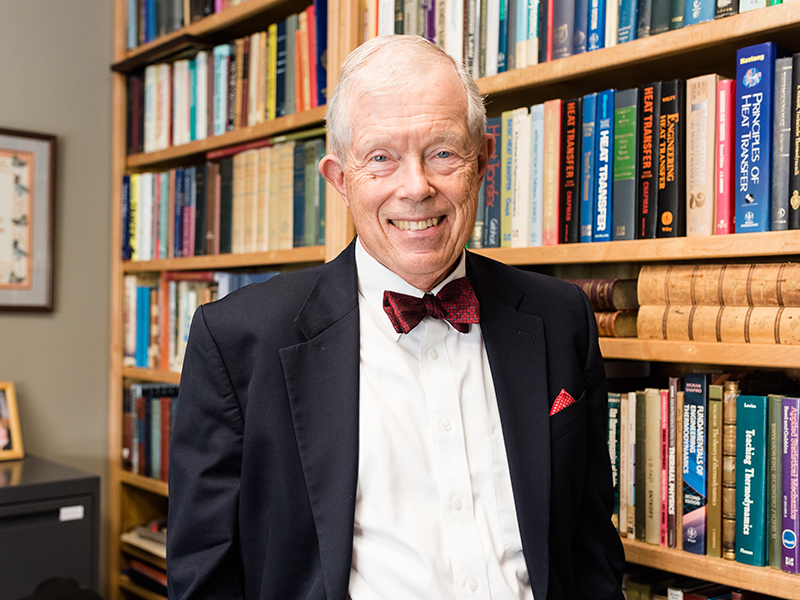Cockrell School professor Ken Diller has been teaching and conducting research on the Forty Acres for more than 40 years, and he previously served as chair of both the biomedical and mechanical engineering departments. Diller spoke with us about his research on human body temperature, his sleep routine and his collection of antique trucks.

What is your research focused on?
I started doing research on the effect of temperature on living systems when I was a graduate student at MIT nearly 50 years ago. My research focuses on understanding the effect of temperatures and how those effects can be used to our advantage, medically. I’ve worked on really varied problems, from freezing tissues to bank them for transplantation, to understanding and treating burn injuries, to working with NASA on space suit design, to using heat to kill cancer.
In a sense, I’ve reinvented myself several times research-wise, but there’s been a common theme: I am an engineer who understands heat and thermodynamics, and I apply that to living systems.
What are some of your most recent projects?
I am working now on what’s called the human thermoregulatory system, which is how the body maintains its internal temperature. We have discovered ways to influence the body’s temperature on demand, and we are using that in a clinical trial to keep patients warm during surgery, which is a major issue nationally.
Our body’s temperature also plays a huge role in how well we can sleep, including our ability to fall sleep and then have a good sleep through the night. Some of the specific mechanisms that the body uses to regulate temperature for sleep have not been clearly identified. We have identified those mechanisms, and we have discovered ways to do very simple and safe interventions that can have a huge impact on how people sleep.
How does your research change your own day-to-day life?
Well, once I discovered how to use this physiological understanding for better sleep, I use the methods we’ve identified and so does my wife. [laughs at himself]
For example, it has been proven scientifically that it is very challenging to fall asleep if you have cold hands and feet. Typically what people do is put on socks and gloves, and that only insulates the outside. But, the way to have warm hands and feet is to supply warm blood to the inside, which you can do by heating your neck. So if I have cold hands and feet when I’m going to bed, I simply put my electric heating pad on my pillow; instead of laying there not falling asleep very well, my hands and feet are warm within minutes, and off I go to sleep.
What are your hobbies?
I have been interested in all things mechanical since I was very, very young. Early on I had lots of sports cars and motorcycles and all sorts of things that populated my parents’ garage, and I spent countless hours working on them. I still enjoy doing that — I have a whole fleet of antique heavy-duty trucks, and we live on a ranch so I’ve got all kinds of farming and construction equipment. I’ve got my own fire engine, my own dump truck, my own 18-wheeler, and my own Bobcat-style loader.
My wife and I are also very heavily involved in church activities, and quite often I share a message on Sunday mornings and have various group activities in our home.
I am very dedicated to my family, to my profession, to my faith. And that pretty much sums it up.
What do you like most about being at UT Austin?
I really enjoy my research. This work has resulted in lots of patents and, from them, start-up companies to provide medical devices for health care.
I also have been faculty advisor to the Christian Students on Campus organization, almost ever since I’ve been at UT. The students asked me a few years ago if I would teach a signature freshman course on a topic that they request me to lecture about quite often. The result is a course called Science and the Bible. Many students who take this course tell me it has been a life-changing experience. I derive a very high level of personal satisfaction teaching a topic like that to a very intellectually and spiritually diverse set of students. A wide variety of students, from committed Christians to committed atheists, sign up for it, and we just have a remarkable time exploring challenging subjects together.







